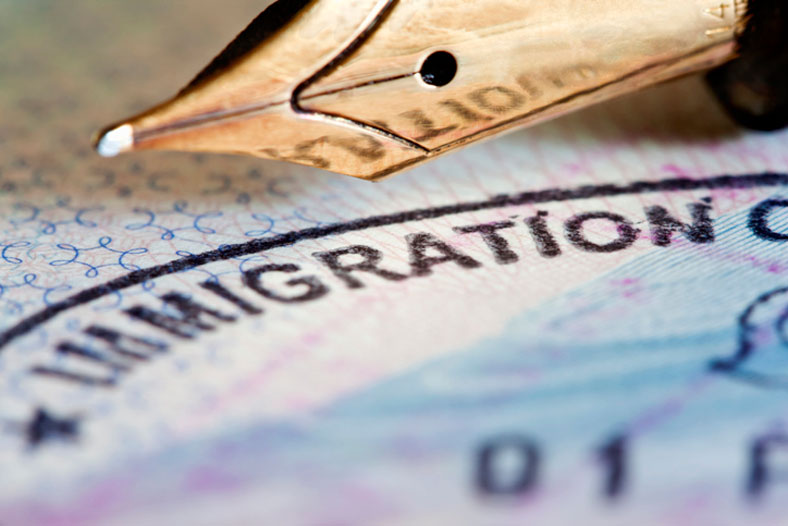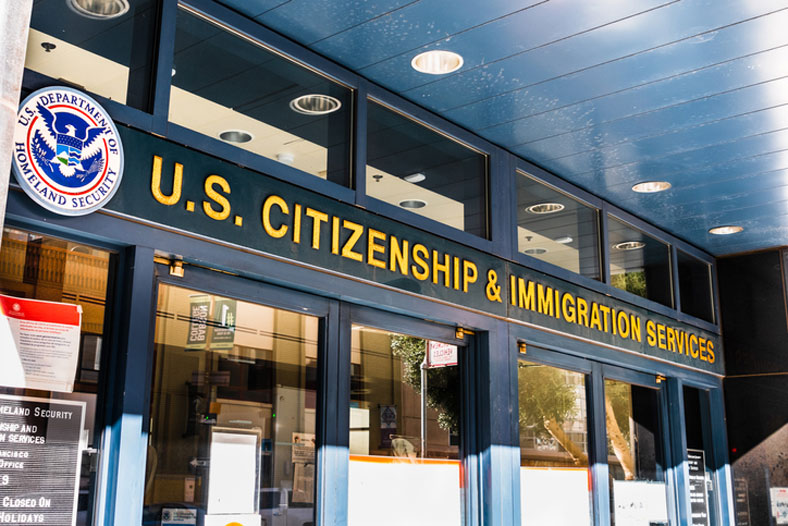Written by Sam Medley

Immigrants make up 16 percent of the U.S. adult population, and nearly 11 million (23%) live in California. Most of the state’s immigrants were born in Asia and Latin America, according to 2023 data from the Public Policy Institute of California.
In Spring 2023, the Kaiser Family Foundation and the Los Angeles Times conducted a survey of 3,358 immigrant adults in and carried out 13 focus groups with immigrant adults across the country in the largest survey of immigrants living in the United States to date.
And on October 10, 2023, the AP reported that U.S. Customs and Border Protection have released roughly 13,000 migrants to the streets of San Diego since Sept. 13, and the city is seeing another 500 arrive each day in what the San Diego government has called “an unprecedented humanitarian crisis.”
Qualified social workers are desperately needed to address the demands on California’s social services and nonprofit organizations designed to help immigrants transition to their new environment.
Immigrants and refugees may be asylum seekers escaping gang violence in their hometowns, human trafficking, kidnapping, and other crimes, or they may have come to the United States seeking a better life for themselves and their families. Regardless of their reasons, many immigrants have experienced discrimination at work, in their communities, and in health care settings.
According to the KFF/LA Times survey, even immigrants who are residing in the country legally have concerns about being deported and avoid interactions with police or employers.
Respondents say:
- They don’t have enough information to understand how U.S. immigration laws affect them and their families – 45%
- They worry they or a family member could be detained or deported – 26%
- Unsure whether use of public assistance for food, housing, or health care can affect their ability to get a green card – 75%
The survey underscores the need for social workers, case managers, and immigration consultants in California to assist the millions of immigrants in the state with everything from accessing legal aid to providing mental health services.
Becoming an Immigration Social Worker in the Golden State
Immigration social workers are among California’s frontline social work practitioners. To get to this level, you’ll need the minimum education and license required by the state or the organization to which you apply.
In California, only licensed clinical social workers (LCSW) need a license to practice. Once you’ve completed your MSW program and your field education requirements, you can take the California Law and Ethics exam and ASWB’s Clinical Exam and apply for your license.
Remember that not all immigration social work positions will require a license—or a master’s degree. Check with the organization’s website or visit CalCareers to learn about specific job requirements.
Immigration social work salaries will vary, but obtaining the credentials you need to practice in California will get you in the door and allow you to be a part of the fight for immigrant rights in the state.
The Role of the Immigration Social Worker in Present-Day California
California, like the rest of the United States, has changed since the last surge in immigration. According to PBS, in years past, immigrants were often single adults with connections in the United States. But now more families are entering the country, and they are doing so without the aid of friends or relatives, which increases the demand for social services and protection.
Communication has also evolved, with social media allowing migrants to share information and find assistance. Add this to Texas and Florida busing hundreds of migrants to Los Angeles and Sacramento, and California is in dire need of immigration social workers who can alleviate some of the anxiety and trauma migrants are experiencing in this new era of border policy and state rebellion.
In early October 2023, Assembly member Wendy Carrillo, a Democrat from Los Angeles, told CalMatters, “While the governors of Florida and Texas have decided to play politics with human lives, our state has decided to take a compassionate approach towards individuals who are in need of care. For me, it’s about coming together as a state to recognize the humanity of people, and treating them with dignity, rather than engaging in political theatrics.”
The immigration Services Bureau (ISB) under the California Department of Social Services oversees immigrant integration initiatives that including community education, outreach, and legal services for people and families entering the state from other countries.

California Immigration and Refugee Organizations and Programs
Immigration and refugee coalitions and nonprofits funded by the California government offer a variety of services to protect the civil rights of immigrants, assist with naturalization applications, provide employment services, help them obtain legal status, access educational resources, and support immigrant women and children who have survived domestic or sexual violence or other crimes.
Immigration social workers will find a vast number of employment opportunities in California, especially in large cities and urban areas, including Los Angeles, San Francisco-Oakland, San Diego, Sacramento, and San Jose.
Community Preparedness and Resilience (CPR) Services
CPR provides critical assistance services for emergencies and disasters, such as the COVID-19 pandemic and the California wildfires, that affect immigrant communities. It also helps migrants in California who have been affected by changes in border policies and other federal immigration policies.
Unaccompanied Undocumented Minors (UUM) Program
UUM has funded nonprofit organizations and pro-bono legal service organizations to help unaccompanied undocumented minors in the California Office of Refugee Resettlement’s custody or living with family members or a sponsor after being released from the ORR. The program also grants removal defense services to unaccompanied immigrant youth (UIY) who have not been processed by the ORR.
The following organizations work with LCSWs and immigration social workers to provide social services and trauma-informed care to clients and mentoring attorneys to support the well-being of immigrant children and families. Case workers help clients access public benefits, mental health support, and housing assistance, among other resources.
UUM legal services funding recipients that provide immigration social services include:
- Social Justice Collaborative
- Canal Alliance
- Catholic Charities of Los Angeles, Inc.
- Immigrant Defenders Law Center
- Immigration Center for Women & Children
- International Institute of Los Angeles
- Kids In Need of Defense
- East Bay Sanctuary Covenant
Opportunities for Youth (OFY) Project
The Opportunities for Youth Project offers “culturally and linguistically responsive, trauma-informed, post-release supportive services” to UUMs and their families in the Bay Area and the Southern and Central Regions of California.
Immigration social workers provide case management, mentorship, and wellness services that support immigrant youth and connect them with community resources.
- Canal Alliance
- Centro La Familia Advocacy Services
- Community Justice Alliance
- Esperanza Immigrants’ Rights Project
- International Institute of Los Angeles
- Mixteco Indígena Community Organizing Project
- Oakland Unified School District
- San Bernardino Community Services Center
Immigration Services Funding (ISF) Program
Also known as One California, ISF funds nonprofits that offer immigration legal services, education and outreach, and legal training and technical assistance to migrants, asylum seekers, and refugees.
Immigration social workers play an essential role in alleviating the challenges that continue to plague immigration service providers in the wake of the pandemic. Court closures and U.S. Citizenship and Immigration Services delays, and remote delivery of legal and social services were all a result of the pandemic, and immigrant advocates are still feeling the effects.
At the end of 2022, nearly two million asylum and Special Immigrant Juvenile Status (SIJS) cases were pending in immigration court, and over 470,000 were pending at the asylum office. Trained immigration social workers can ease this burden on social agencies and nonprofit advocates such as:
- Immigrant Institute of the Bay Area
- Central American Resource Center of California (CARECEN)
- Coalition for Humane Immigrant Rights of Los Angeles (CHIRLA)
- Immigration Center for Women and Children
- Asian Pacific Islander Legal Outreach
- California Human Development
- Opening Doors, Inc.
Removal Defense Program
In addition to the legal services provided by CDSS-funded organizations under the Removal Defense (RD) program, immigrants and refugees receive social services associated with the client-centered legal approach that these legal advocates provide.
Under the Immigrant Legal Resource Center, organizations that receive funding from the program offer violence prevention services, citizenship collaboratives, labor rights information, education assistance, access to health care, and consumer protections specific to immigrant communities.
Organizations that provide these services include:
- Canal Alliance
- Asian Pacific Islander Legal Outreach
- Centro Legal de la Raza
- Community Legal Services in East Palo Alto
- Social Justice Collaborative
- Asian Americans Advancing Justice Los Angeles
- Human Rights First
- International Institute of Los Angeles
- Los Angeles LGBT Center
- California Rural Legal Assistance Foundation
Immigration Law and Integrated Social Service Professionals
The integration of legal services and immigration social work is essential for the overall well-being of immigrants and the stability of California’s communities.
Naturalization, Deferred Action for Childhood Arrivals (DACA), U Visas, the Violence Against Women Act (VAWA), and asylum, removal defense, and other remedies are delicate matters affecting vulnerable people who may have already endured trauma, violence, and displacement.

Immigration social workers and experienced mental health professionals, such as LCSWs, contribute to holistic legal representation by administering services directly to clients and providing legal support.
The Los Angeles Center for Law and Justice for the Vera Institute of Justice published a guide for the Children’s Holistic Immigration Representation Project (CHIRP) that explains how social workers “identify and address [a client’s] intersecting needs,” arising from trauma, unemployment, health problems, and homelessness.
Direct Client Services
- Conduct a biopsychosocial assessment with a diagnosis
- Conduct a biopsychosocial assessment without a diagnosis
- Provide non-clinical counseling/ social and emotional support
- Psychoeducation, introduce coping skills
- Case management services (Warm handoffs to housing, health care, social services, food banks, education services, and related community resources)
- Mediate with family and support systems
- Advocacy with external systems (Education, Dependency, Delinquency, etc.)
Legal Support Services
- Accompany clients to court, court related appointments
- Gather and help interpret mental health, education, and related records
- Provide written documentation in support of legal case
- Help attorneys develop a client advocacy plan, identify barriers to in-court testimony
- Support the attorney in using trauma-informed interviewing approaches
- Serve as a mental health expert
Many legal service providers offer internships and volunteer opportunities that may be applied to the requirements of a BSW or MSW program and may meet the criteria for obtaining licensure to become an LCSW.
2022 US Bureau of Labor Statistics job market trends and salary figures for child, family, and school social workers, healthcare social workers, mental health and substance abuse social workers, and social workers (all other) are based on national data, not school-specific information. Conditions in your area may vary. Data accessed December 2023.
Discover more about other social work specializations in California.




